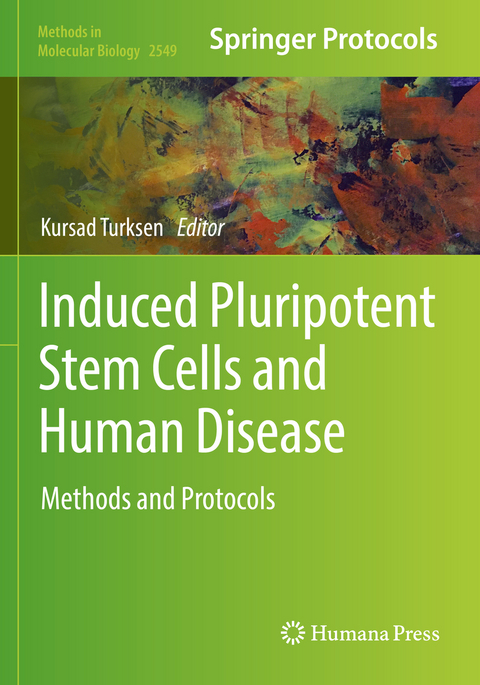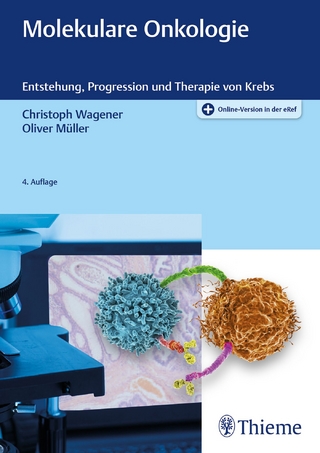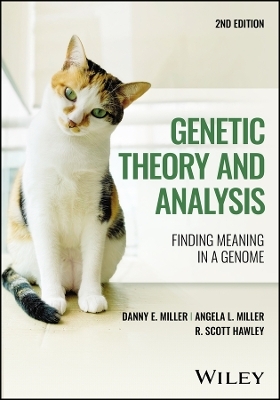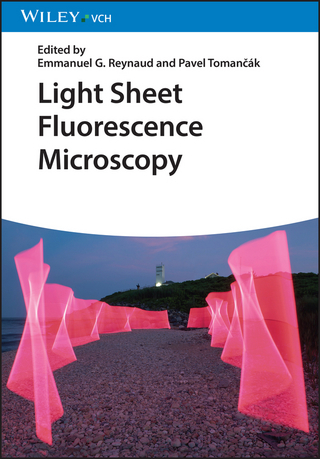
Induced Pluripotent Stem Cells and Human Disease
Springer-Verlag New York Inc.
978-1-0716-2587-3 (ISBN)
This detailed volume presents a series of protocols that are representative of recent developments and improvements in induced pluripotent stem cells (iPS cells) and corresponding human disease models. Reflecting the latest technology for generating induced pluripotent stem cells (iPS cells) and their initial characterization, the book explores techniques invaluable both for studies of disease-specific cell types and for their potential applications in regenerative medicine. Written for the highly successful Methods in Molecular Biology series, chapters include introduction to their respective topics, lists of the necessary materials and reagents, step-by-step and readily reproducible laboratory protocols, as well as tips on troubleshooting and avoiding known pitfalls.
Authoritative and practical, Induced Pluripotent Stem Cells and Human Disease: Methods and Protocols serves as a vital guide that is valuable for not only experts but also novices in the stem cell field.
lt;p>1. Analysis of Mitochondrial Dysfunction by Microplate Reader in hiPSC-Derived Neuronal Cell Models of Neurodegenerative Disorders
Tatiana R. Rosenstock, Congxin Sun, Georgina Wynne Hughes, Katherine Winter, and Sovan Sarkar
2. Generation and Hematopoietic Differentiation of Mesenchymal Stromal/Stem Cell-Derived Induced Pluripotent Stem Cell Lines for Disease Modeling of Hematopoietic and Immunological Diseases
Gülen Güney-Esken and Fatima Aerts-Kaya
3. Establishment of Human Induced Pluripotent Stem Cells from Multiple Sclerosis Patients
Onur Can Begentas, Dilara Koc, and Erkan Kiris
4. Monitoring Axonal Degeneration in Human Pluripotent Stem Cell Models of Hereditary Spastic Paraplegias
Xue-Jun Li, Yongchao Mou, Conrad Milton, and Zhenyu Chen
5. Efficient Generation of Functional Hepatocytes from Human Induced Pluripotent Stem Cells for Disease Modeling and Disease Gene Discovery
Satish Kumar, Joanne E. Curran, Sarah Williams-Blangero, and John Blangero
6. Autophagy Dysfunction as a Phenotypic Readout in hiPSC-Derived Neuronal Cell Models of Neurodegenerative Diseases
Congxin Sun, Tatiana R. Rosenstock, Malkiel A. Cohen, and Sovan Sarkar
7. Derivation of Induced Pluripotent Stem Cell (iPSC) Lines from Patient-Specific Peripheral Blood Mononuclear Cells (PBMC) Using Episomal Vectors
Vijay Bhaskar Reddy Konala, Swapna Nandakumar, Harshini Surendran, and Rajarshi Pal
8. Differentiating Induced Pluripotent Stem Cells toward Mesenchymal Stem/Stromal Cells
Shennea S. McGarvey, Michael Ferreyros, Igor Kogut, and Ganna Bilousova
9. A High-Efficiency Method for the Production of Endothelial Cells from Human Induced Pluripotent Stem Cells
Maryna Pavlova, Shennea S. McGarvey, Ganna Bilousova, and Igor Kogut
10. Image-Based Quantitation of Kainic Acid-Induced Excitotoxicity as a Model of Neurodegeneration in Human iPSC-Derived Neurons
Jana Talbot, Sueanne Chear, Andrew Phipps, Alice Pébay, Alex W. Hewitt, James C. Vickers, Anna E. King, and Anthony L. Cook
11. Amyloid beta (Abeta) ELISA of Human iPSC-Derived Neuronal Cultures
Hirotaka Watanabe, Rei Murakami, and Hideyuki Okano
12. Creating Cell Model 2.0 for Pathogenic Mitochondrial DNA Mutation: iPSC Approach for LHON Mutation
Pragya Singh, Tyler Bahr, Xiaoxu Zhao, Peiqing Hu, Marcel Daadi, TaoSheng Huang, and Yidong Bai
13. CRISPR Guide RNA Library Screens in Human Induced Pluripotent Stem Cells
Yan Zhou, Qiang Fu, Huijun Shi, and Guangqian Zhou
14. Generation and Encapsulation of Human iPSC-Derived Vascular Smooth Muscle Cells for Proangiogenic Therapy
Biraja C. Dash and Henry C. Hsia
15. Methods to Induce Small-Scale Differentiation of iPS Cells into Dopaminergic Neurons and to Detect Disease Phenotypes
Akihiro Yamaguchi, Kei-ichi Ishikawa, and Wado Akamatsu
16. Modeling Early Neural Crest Development via Induction from hiPSC-Derived Neural Plate Border-Like Cells
Diogo Andrade Nani, Gabriella Shih Ping Hsia, Maria Rita Passos-Bueno, and Gerson Shigeru Kobayashi
17. Generation of Human Induced Pluripotent Stem Cells from Renal Epithelial Cells
Miao Yu, Xinglong Han, Lingqun Ye, Wei Lei, and Shijun Hu
18. A Protocol for Stepwise Differentiation of Induced Pluripotent Stem Cells into Retinal Pigment Epithelium
Miho Tagawa, Hanako Ohashi Ikeda, Masayuki Hata, Yumi Inoue, Sachiko Iwai, and Akitaka Tsujikawa
19. Genome Editing of Induced Pluripotent Stem Cells Using CRISPR/Cas9 Ribonucleoprotein Complexes to Model Genetic Ocular Diseases
Heran Getachew, Blanca Chinchilla, and Rosario Fernandez-Godino
20. Generation of Cardiomyocytes and Endothelial Cells from Human iPSCs by Chemical Modulation of Wnt Signaling
Arline Joachim, Shiqiao Ye, and Ming-Tao Zhao
21. Immunoassay for Quantitative Detection of Antibody Transcytosis across the Blood-Brain Barrier In Vitro
Caroline Sodja, Deborah Callaghan, Arsalan S. Haqqani, Danica B. Stanimirovic, Willard J. Costain, and Anna Jezierski
22. Generation of Cortical, Dopaminergic, Motor, and Sensory Neurons from Human Pluripotent Stem Cells
Shermaine Huiping Tay, Winanto, Zi Jian Khong, Yong Hui Koh, and Shi Yan Ng
23. CRISPR/Cas-Mediated Knock-In of Genetically Encoded Fluorescent Biosensors into the AAVS1 Locus of Human Induced Pluripotent Stem Cells
David Stellon, Minh Thuan Nguyen Tran, Jana Talbot, Sueanne Chear, Mohd Khairul Nizam Mohd Khalid, Alice Pébay, James C. Vickers, Anna E. King, Alex W. Hewitt, and Anthony L. Cook
24. Cancer Stem Cell Initiation by Tumor-Derived Extracellular Vesicles
Said M. Afify, Ghmkin Hassan, Ting Yan, Akimasa Seno, and Masaharu Seno
25. Genome Editing Using Cas9-gRNA Ribonucleoprotein in Human Pluripotent Stem Cells for Disease Modeling
Noelia Benetó, Daniel Grinberg, Lluïsa Vilageliu, and Isaac Canals
| Erscheinungsdatum | 05.07.2023 |
|---|---|
| Reihe/Serie | Methods in Molecular Biology |
| Zusatzinfo | 73 Illustrations, color; 12 Illustrations, black and white; XVI, 428 p. 85 illus., 73 illus. in color. |
| Verlagsort | New York, NY |
| Sprache | englisch |
| Maße | 178 x 254 mm |
| Themenwelt | Medizin / Pharmazie ► Medizinische Fachgebiete ► Biomedizin |
| Naturwissenschaften ► Biologie ► Genetik / Molekularbiologie | |
| Naturwissenschaften ► Biologie ► Zellbiologie | |
| Technik ► Umwelttechnik / Biotechnologie | |
| Schlagworte | Cellular biology • Developmental Biology • Human disease models • Pluripotent stem cell platforms • Regenerative medicine |
| ISBN-10 | 1-0716-2587-X / 107162587X |
| ISBN-13 | 978-1-0716-2587-3 / 9781071625873 |
| Zustand | Neuware |
| Haben Sie eine Frage zum Produkt? |
aus dem Bereich


